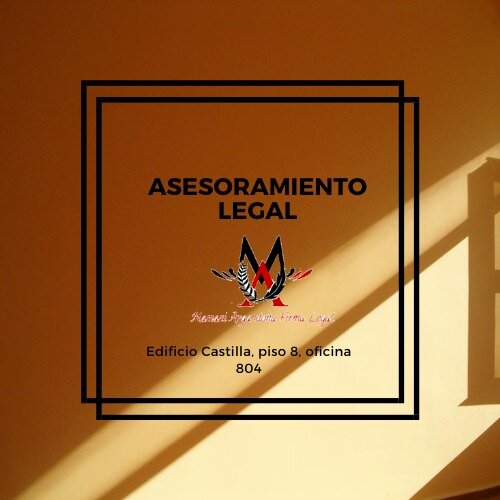Best Merger & Acquisition Lawyers in Bolivia
Share your needs with us, get contacted by law firms.
Free. Takes 2 min.
Or refine your search by selecting a city:
List of the best lawyers in Bolivia
About Merger & Acquisition Law in Bolivia
Merger & Acquisition (M&A) law in Bolivia governs the combination of companies, assets, and other business entities. The regulatory framework facilitates corporate restructuring and market expansion activities. Key considerations include compliance with corporate, competition, tax, and labor laws. The Bolivian legal system aims to promote fair competition and prevent anti-competitive practices, ensuring equitable treatment of stakeholders involved in M&A transactions.
Why You May Need a Lawyer
Engaging in M&A activities can be complex, necessitating expert legal guidance. Here are some common scenarios where legal assistance might be required:
- Transaction Structuring: Determining the optimal structure for a merger or acquisition to maximize benefits and minimize liabilities.
- Due Diligence: Conducting thorough due diligence to identify potential risks and liabilities associated with the transaction.
- Regulatory Compliance: Navigating the regulatory landscape to ensure full compliance with Bolivian laws.
- Contract Negotiation: Drafting and negotiating terms of agreements to protect the interests of the involved parties.
- Dispute Resolution: Addressing any disputes or litigation that may arise during or after the transaction.
Local Laws Overview
Bolivian M&A laws are influenced by both domestic laws and international treaties. Key aspects include:
- Corporate Laws: Governed primarily by the Bolivian Commercial Code, merged entities must comply with corporate governance requirements.
- Competition Law: Enforced by the Bolivian Authority for Competition and Fair Trade (ACFT), focused on preventing monopolistic practices and ensuring market competition.
- Foreign Investment Regulations: Foreign entities must comply with specific regulations concerning ownership and operation in Bolivia.
- Tax Implications: M&A activities are subject to tax obligations which may affect the valuation and financial structuring of a deal.
Frequently Asked Questions
1. What is the role of due diligence in an M&A transaction?
Due diligence involves thoroughly evaluating the financial, legal, and operational aspects of a target company to identify potential risks and ensure informed decision-making.
2. Are there any restrictions on foreign companies looking to acquire a Bolivian company?
Yes, foreign companies must comply with Bolivian foreign investment laws, including registration and obtaining necessary approvals.
3. What regulatory approvals are required for M&A transactions in Bolivia?
Transactions may require approval from the ACFT or other government bodies depending on the sector and the transaction size to ensure compliance with competition laws.
4. What are the typical timelines for completing an M&A transaction in Bolivia?
Timelines vary based on transaction complexity and regulatory approvals, often ranging from a few months to over a year.
5. How are employees affected in a merger or acquisition?
Employees may be impacted in terms of job restructuring and contract amendments, but labor laws ensure their rights are protected throughout the process.
6. What are some common challenges faced during M&A in Bolivia?
Common challenges include regulatory hurdles, cultural differences, integration issues, and valuation discrepancies.
7. Can intellectual property be transferred in an M&A transaction?
Yes, intellectual property can be transferred as part of the transaction, subject to proper documentation and compliance with IP laws.
8. What mechanisms are in place for dispute resolution in M&A transactions?
Dispute resolution can involve mediation, arbitration, or legal proceedings, guided by Bolivian commercial arbitration laws or as per contractual agreements.
9. How does tax structuring affect an M&A deal?
Tax structuring is crucial as it impacts the transaction's financial outcome and the parties' liabilities, requiring careful planning under Bolivian tax laws.
10. Is it mandatory to hire a local lawyer for M&A activities in Bolivia?
While not mandatory, hiring a local lawyer is highly advisable due to their knowledge of local regulations and practices, ensuring compliance and efficient transaction management.
Additional Resources
Below are some resources and organizations that may provide further assistance:
- Bolivian Authority for Competition and Fair Trade (ACFT)
- National Chamber of Commerce (Cámara Nacional de Comercio)
- Ministry of Economy and Public Finance
- International legal directories and law firms specializing in M&A
Next Steps
Should you require legal assistance in M&A, consider the following steps:
- Research: Begin by researching law firms and attorneys specializing in M&A in Bolivia.
- Consultation: Schedule consultations with potential legal advisors to discuss your needs and evaluate their expertise and approach.
- Engagement: Engage a lawyer who not only meets your requirements but also demonstrates a comprehensive understanding of the local M&A landscape.
- Collaboration: Work closely with your legal team throughout the transaction process to ensure all legal and regulatory aspects are addressed.
Lawzana helps you find the best lawyers and law firms in Bolivia through a curated and pre-screened list of qualified legal professionals. Our platform offers rankings and detailed profiles of attorneys and law firms, allowing you to compare based on practice areas, including Merger & Acquisition, experience, and client feedback.
Each profile includes a description of the firm's areas of practice, client reviews, team members and partners, year of establishment, spoken languages, office locations, contact information, social media presence, and any published articles or resources. Most firms on our platform speak English and are experienced in both local and international legal matters.
Get a quote from top-rated law firms in Bolivia — quickly, securely, and without unnecessary hassle.
Disclaimer:
The information provided on this page is for general informational purposes only and does not constitute legal advice. While we strive to ensure the accuracy and relevance of the content, legal information may change over time, and interpretations of the law can vary. You should always consult with a qualified legal professional for advice specific to your situation.
We disclaim all liability for actions taken or not taken based on the content of this page. If you believe any information is incorrect or outdated, please contact us, and we will review and update it where appropriate.
Browse merger & acquisition law firms by city in Bolivia
Refine your search by selecting a city.

















